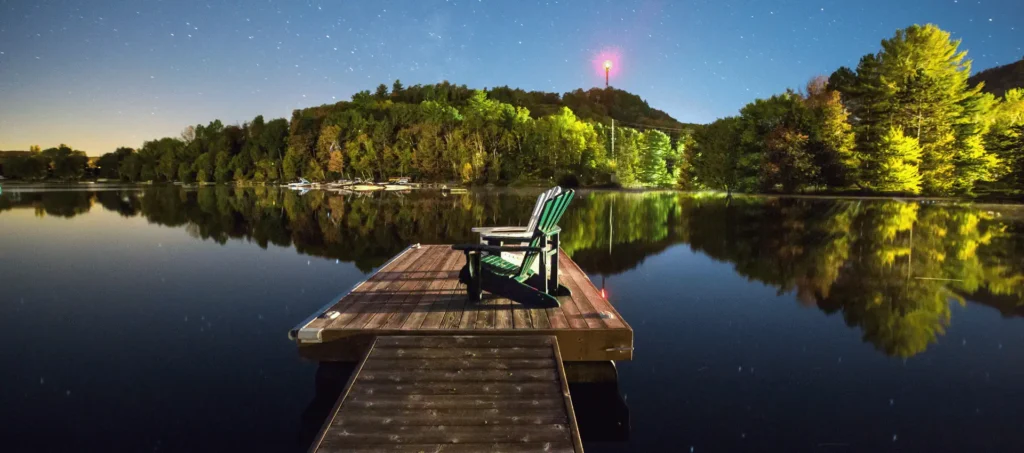- Make sure the property title is clean!
- Do I need a new survey of the property?
- Title is clean, what next?
- Clean Drinking Water
- Sewage System
- Building Inspection
- Access Road
- What if I don’t have a right of access?
- Do I own the beach at the end of my cottage?
- Can I build a dock?
- Can I increase the size of my lot in the water?
- I’m a non-resident, can I buy a cottage property in Canada?
- Learn More
Make sure the property title is clean!
This is an important first step in securing your first cottage property, and one where an experienced lawyer will be of great value. Your lawyer will need to make sure that the title to the property is clear, with no liens or encumbrances on the property. This title search is a very important step when purchasing a property. You want to be absolutely certain that you own it completely and that no one else holds an interest in the property that you will be on the hook for.
Do I need a new survey of the property?
A survey of the property, especially if it is a very old property, can be useful to ensure accurate borders and establish exactly what you are purchasing. However, some people may forgo this step if they purchase Title Insurance. Title Insurance will usually protect a purchaser from defects that an up-to-date survey would have disclosed. Because an Ontario land surveyor can be more expensive than the premium for title insurance, people take the option for title insurance. You should speak to your real estate lawyer about the benefits of a survey and title insurance to know exactly which option you should take.
Title is clean, what next?
Once you and your lawyer have established that there are no concerns with the title and there are no issues with the boundaries of your future cottage property, you’ll want to make sure that you and your lawyer demand a few important conditions in the agreement of purchase and sale.
Clean Drinking Water
If the water supply for the cottage property comes from a well, you’ll want to have a condition that subjects that water to a well water test to make sure it is drinkable. You can request to have a bacterial analysis done by the local health authority and you’ll also want to make sure that there is adequate water supply to meet your household needs. This will be a crucial step for your health and for the enjoyment of your property.
Sewage System
Making sure the sewage system works is another important inspection to demand when purchasing a cottage property. A septic tank can be expensive to replace, so you’ll want to ensure that there is a pump and inspection done by a qualified company to make sure that the system is in good working order before closing the deal.
Building Inspection
A structural inspection of the building is a crucial element to insist on when purchasing a cottage property. Some cottage properties can be very old and can hide serious structural problems. This poses a significant financial risk to you as it may cost you a lot of money to repair later. You will want to ensure that an initial inspection is done, and a final inspection is done before the agreement is signed. A building inspection will help identify any potential issues that will require repairs or renovations, and you absolutely do not want to sign any agreement until this has been completed.
Access Road
If you’re a first-time cottage buyer, you might assume that any property you buy will be accessible by a road. This is not always the case. Before purchasing the property, you will want to ensure that you have the legal right to travel over any roads leading to the property. There would be nothing worse than buying a cottage property and not being able to access it. Sometimes a cottage property will have a deeded right of way, which means you will own the right to travel over the road into the property. If there is no deeded right of way, the road may be running over a property that is subject to a right of way, which would also permit you to use the road to access your cottage property. Having the legal right to travel to your property is an important thing to consider. If there is no established right, you might still have what is called a prescriptive right of way. This is a right of way that exists if the present owner, or the predecessors of the property, have used a particular roadway over the past 20 years to access that property. Your real estate lawyer will help you determine if any of these rights exist.
What if I don’t have a right of access?
It is possible that your cottage property will not have any of these rights. In that case, it is always possible to negotiate an agreement with an adjacent property owner to use their land to access your property. Or, your lawyer can bring an application to the Superior Court under the Road Access Act to designate the road as an access road. However, be aware that this is a time-consuming and expensive process which may not be in your best interest. This is why guaranteeing that you have a right of access to your cottage property is not only an important legal step, but a practical one that can prevent problems and save you money.
Do I own the beach at the end of my cottage?
Many waterfront cottage properties in Ontario go around lakes, some of them have a small beach at the end of the property. It is important to know that you do not automatically own the beach. Your property boundary, if it extends out to the water, will be up to the low-water mark, which will grant you the right to the beach area. However, it is possible that your property boundary does not go all the way up to the water, leaving any potential beach area outside of your property claim and accessible to the public. Working with a real estate lawyer can help you determine whether the property includes the beach portion or not.
Can I build a dock?
Building a dock on the water is a practical way to enjoy your cottage’s waterfront access. However, there are restrictions as to how big you can build them. Under the Navigation Protection Act you cannot build a structure that impedes navigation on the water. For example, you cannot build a very long dock going into the water. More practically, under the Public Lands Act, you cannot build a dock, or any other structure on the water that is larger than 15 square meters. You will require a permit for anything over that size. If your cottage property is under the conservation authority’s jurisdiction, there may also be further restrictions on what structures you can build, and you may require permission to do so.
Can I increase the size of my lot in the water?
The short answer to this is no. Under the Public Lands Act, you cannot increase the square footage of your land, even if the water that was once there as a lake or river is gone. This filled-in land will still sit on Crown land and will not be your property. It is a risk to change the shape and size of your property. Not only can you not extend your property boundaries by filling in land, but you also run the risk of losing parts of your property if you are not careful near navigable bodies of water. This is what happened to an individual who lived along the St. Lawrence River and dredged out land on his property. When the land filled up with water from the river the court considered that area to be part of the navigable water of the river and the owner could no longer prevent others from navigating over it (Simpson Sand Co. v Black Douglas Contractors 1964 SCC). Attempting to change the size of your waterfront cottage property is a serious risk that is not only prohibited by the Public Lands Act but can have significant financial consequences for you as the property owner.
I’m a non-resident, can I buy a cottage property in Canada?
On January 1, 2023, the Prohibition on the Purchase of Residential Property by Non-Canadians Act came into force. The Act prohibits non-Canadians from purchasing residential property in Canada, with some outlined exceptions. However, the Act does not prohibit non-Canadians from purchasing recreational properties such as summer cottages and vacation homes, if the properties are located outside of a Census Metropolitan Areas (CMA) or Census Agglomeration (CA). A CMA has a total population of at least 100,000 with 50,000 or more living in the core, while a CA must have a population of at least 10,000. The Canada Mortgage and Housing Corporation provides a mapping tool to guide you as to whether your proposed cottage property is located within one of these areas. If it exists outside of these areas you are exempt from the restrictions and can purchase a cottage property as a non-Canadian.
Learn More
Business Charity Child Support community Contracts COVID-19 divorce Estate Planning Family Law immigration Incorporation In The News Not For Profit Postnup Power of Attorney Real Estate Registration separation agreement Sponsorship Startup Taxes Wills Wills & Estates Wills and Estates Work Permit


